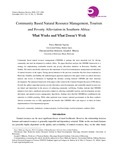Please use this identifier to cite or link to this item:
http://hdl.handle.net/10311/1315Full metadata record
| DC Field | Value | Language |
|---|---|---|
| dc.contributor.author | Ngwira, Percy M. | |
| dc.contributor.author | Kolawole, Oluwatoyin D. | |
| dc.contributor.author | Mbaiwa, Joseph E. | |
| dc.date.accessioned | 2014-12-11T12:30:40Z | |
| dc.date.available | 2014-12-11T12:30:40Z | |
| dc.date.issued | 2013 | |
| dc.identifier.citation | Ngwira, P.M. et al. (2013) Community based natural resource management, tourism and poverty alleviation in Southern Africa: what works and what doesn’t work, Chinese Business Review, Vol. 12, No. 12, pp. 789-806. | en_US |
| dc.identifier.issn | 1537-1506 | |
| dc.identifier.uri | http://hdl.handle.net/10311/1315 | |
| dc.description.abstract | Community based natural resource management (CBNRM) is perhaps the most important tool for driving community and rural development in southern Africa. The paper therefore analyses the CBNRM framework as a strategy for implementing sustainable tourism and poverty alleviation initiatives in Botswana, Namibia, and Zambia. The article specifically underscores the importance of local-level participatory management and utilization of natural resources in the region. Paying special attention to the previous researches that have been conducted in Botswana, Namibia, and Zambia, the methodological approach employed in the paper centres on critical discourse analysis and review of literatures to highlight the interface existing between CBNRM and rural (tourism) development. The analytical framework of the paper is thus rooted in the Common Property Resource (CPR) theory. Overall, the authors argue that tourism, poverty alleviation, rural development, and sustainable natural resource use are linked and interrelated in the process of enhancing community well-being. Findings indicate that CBNRM initiatives have had a significant and positive impact in achieving sustainable tourism, rural development, poverty alleviation, and natural resource management. Specifically, findings show that the CBNRM has contributed to the reduction in wildlife poaching. While other pertinent issues remain, national governments in the three southern African economies need to fully appropriate the benefits that CBNRM offers and improve on them for better implementation of developmental programs. | en_US |
| dc.language.iso | en | en_US |
| dc.publisher | David Publishers, http://www.davidpublishing.com | en_US |
| dc.subject | Community | en_US |
| dc.subject | Institutions | en_US |
| dc.subject | Common property | en_US |
| dc.subject | Local knowledge | en_US |
| dc.subject | Rural development | en_US |
| dc.subject | Southern Africa | en_US |
| dc.title | Community based natural resource management, tourism and poverty alleviation in southern Africa: what works and what doesn’t work | en_US |
| dc.type | Published Article | en_US |
| dc.link | http://www.davidpublishing.com/davidpublishing/Upfile/4/29/2014/2014042984007833.pdf | en_US |
| Appears in Collections: | Research articles (ORI) | |
Files in This Item:
| File | Description | Size | Format | |
|---|---|---|---|---|
| CBNRM_Chinese Business Review_Ngwira_Kolawole_Mbaiwa (2013).pdf | Main article | 298.49 kB | Adobe PDF |  View/Open |
Items in DSpace are protected by copyright, with all rights reserved, unless otherwise indicated.
